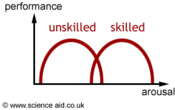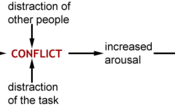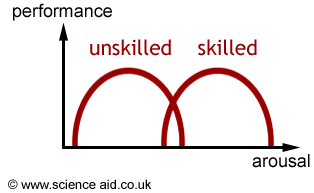Social Facilitation: Drive Theory, Evaluation Apprehension, Distraction Conflict
Edited by Jamie (ScienceAid Editor), Jen Moreau, Denise Currie, StephWrites
Mere Presence
Social facilitation is the increased likelihood that someone will perform better at a task because of the mere presence of others. Mere presence can either come in the form of co-actors or an audience.
Co-actors are people who perform the same task alongside you. A very early study by Norman Triplett in 1898 looked at cyclists. He looked at the differences in times for cycling when alone and when in a group. He found times were 30% less when in a group.
Drive Theory
However, there is not simply a nice correlation between an audience/co-actors and improved performance. If you are asked to do something completely new for example, your performance would be worse in front of an audience than on your own.
To help solve this problem, Robert Zajonc (pronounced [zi - ance]) put forward Drive Theory where he used the term dominant response to refer to the behavior we are most likely to perform in a given situation. This is illustrated in the following study by Michaels et al.
| Aim | To test the if the presence of an audience would facilitate well-learned behaviors and inhibit poorly learned. |
| Method | To begin with, student pool players were observed.
Following this, twelve were chosen: six above and six below average. In the second part, four passive observers stood around the table and watched the game. |
| Results | The above average players' accuracy increased from 69 to 80%.
The below average players accuracy fell from 36 to 25%. |
| Conclusion | The results lend support to Zajonc's dominant response theory. The dominant response of skilled pool players is to improve in the presence of an audience, whereas the dominant response of unskilled players is to do worse. |
| Evaluation | The sample used was very small and of a limited demographic (only students) |
However, there are some cases where people who are good at their sport do not perform well with an audience but are fine in training. This lead to drive theory to be developed into the inverted You hypothesis which can be represented using the graph below:
It shows that arousal (more stress, adrenaline etc) will increase with performance until an optimum point where it will decline.
The You of someone who is highly skilled is higher than that of someone unskilled. This explains dominant response; it also means that a well-skilled player needs a lot of arousals to get them started in the first place: explaining why world records are often broken at international tournaments like the Olympics.
Evaluation Apprehension
This theory of social facilitation was put forward by Cottrell, he said that rather than the mere presence of others, it is the "worry" of being "'judged" that affects performance.
If you are confident in your ability, then being watched makes you perform well, because, in effect, you are showing off. But if you are not confident about the task then you will constantly be worrying about being evaluated. A study for this theory is by Bartis et al (1988)
| Aim | To find out whether evaluation apprehension would improve performance on a simple task and inhibit it in a complex one. |
| Method | All participants had the basic task of thinking of different uses for a knife. However, half were asked to think of creative uses' of a knife (complex) and a half to merely list all uses of a knife (simple).
These two groups were further divided between those that were told they would be individually identified (evaluation apprehension) and those whose results would be pooled with everybody else's. |
| Results | In the evaluation apprehension condition, the simple task gave more results but the complex task gave fewer uses for a knife. |
| Conclusions | Evaluation apprehension increases performance on simple tasks but decreases performance on complex ones. |
| Evaluation | This was again an artificial task performed in a laboratory, so the results are not very relevant to the sport. |
Distraction Conflict
This is the final major theory of social facilitation. Put forward by Saunders et al (1978), it is based on the following research:
| Aim | Test the effect of distraction-conflict on performance in a task. |
| Method | Participants were presented with either a simple or difficult task to perform in the presence others who were performing either the same or a different task. |
| Results | Participants in the high distraction condition (with co-actor) performed better on the simple task but worse on the complex. |
| Conclusion | The results provide support for distraction conflict theory. |
| Evaluation | This theory also could explain social facilitation that has been found in animals (for example ants and cockroaches) since these animals can hardly be affected by evaluation apprehension. |
The diagram below illustrates how the demands of a task lead to conflict, which produces social facilitation effects.
Questions and Answers
Evaluation apprehension and self-serving attributions?
Need a clear understanding of how evaluation apprehension reduces tendencies to provide self-serving attributions
Although evaluation apprehension may be considered as an external attribution that can affect an individual´s performance, there is no article yet that relates it specifically to self-serving attributions. However, we can provide you with sources to get a better understanding of both of them. To find out more about evaluation apprehension, you can read this extensive model explanation found at Revolvi website. And to learn more about self-serving attributions, we suggest this paper from the University of Waterloo, Ontario, Canada
Am I right in concluding there is a few different theories about social facilitation, each with their own merits?
I haven't quite got the distraction conflict. please, could you elaborate on that for me? many thanks. I am new to this subject, so just trying to get my head around it! I have tried: Reading your articles, and others about social facilitation. I think it was caused by just that it is a new concept for me to understand. it is interesting though and I'd like to understand it better
There are many theories although it seems like, as this article by Saul McLeod says "the extent of social facilitation or inhibition depends upon the nature of the interaction between the task and the performer". We encourage you to read it to get a better understanding on social facilitation. To get a thorough knowledge about the distraction conflict, we suggest that you read this academic paper presented by Robert S.Baron, although you will have to sign in to the website or pay for the article.
Referencing this Article
If you need to reference this article in your work, you can copy-paste the following depending on your required format:
APA (American Psychological Association)
Social Facilitation: Drive Theory, Evaluation Apprehension, Distraction Conflict. (2017). In ScienceAid. Retrieved Apr 16, 2024, from https://scienceaid.net/psychology/social/facilitation.html
MLA (Modern Language Association) "Social Facilitation: Drive Theory, Evaluation Apprehension, Distraction Conflict." ScienceAid, scienceaid.net/psychology/social/facilitation.html Accessed 16 Apr 2024.
Chicago / Turabian ScienceAid.net. "Social Facilitation: Drive Theory, Evaluation Apprehension, Distraction Conflict." Accessed Apr 16, 2024. https://scienceaid.net/psychology/social/facilitation.html.
If you have problems with any of the steps in this article, please ask a question for more help, or post in the comments section below.
Comments
Article Info
Categories : Social
Recent edits by: Denise Currie, Jen Moreau, Jamie (ScienceAid Editor)










